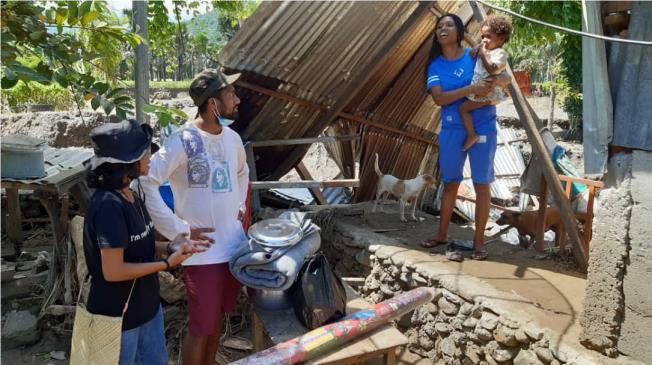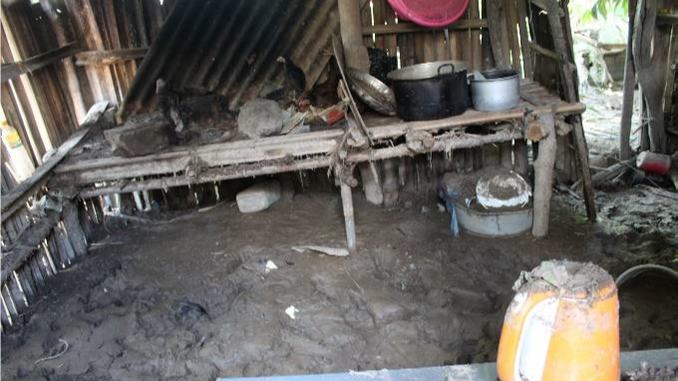Carmelite Community Development Ministry Coordinator
Houses built alongside rivers, canals and in low-lying areas near the beach were particularly vulnerable. Many homes were washed away, some were buried under landslides, others were filled with water up to peoples’ waists. Thousands of families worked through the night trying to stem the flow of the water and reduce the damage to their homes and belongings. While others faced dangerous situations and were forced to flee with just the clothes they were wearing. 45 people died because of the cyclone; over 25,000 households have reportedly been affected by floods across the country; and over 10,000 people have sought shelter in temporary evacuation facilities in Dili.
A natural disaster like these floods is undoubtedly tragic and traumatic. The initial aftermath is emotionally and physically intense. And yet it is also a moment for collaboration and connection, a space in which people can directly express the values of justice and peace. In the words of the Carmelite Brothers in Timor, it has been a time to be ‘pro-active’ and ‘open-hearted’. Having not experienced any flooding in the Carmelite community houses themselves, the Brothers and seminarians were able to immediately launch into outreach activities with their local communities.
In Hera, situated just outside Dili, Fr Fausto OCarm has described several homes that are “filled with mud as high as the windows. You can’t even walk into those houses, it’s just a wall of mud”. Many families who live in the community around the Carmelite House there have been damaged, while some have lost everything. “There are 13 families who we are now completely responsible for. They have all lost their homes,” explains Fr Fausto. Fr Exposto OCarm also described the situation in Hera after the floods. “There are four evacuation centres here in Hera now with over 200 families registered, but there are so many people who have been impacted and haven’t gone to an evacuation centre. Some are staying at their family’s houses or with their neighbours. One family is living in a simple shack in their rice fields that they usually just use for shade during the harvest season.” The Carmelite Brothers in Hera have been using their cars and trucks to visit rural and isolated communities. “We have visited every hamlet in Hera. More than 400 families. For all the people we visited, we offered basic things like rice, noodles, cooking equipment and clothes, because they had nothing.”
In the days following the cyclone, the Carmelite Brothers were sometimes the first people to make contact with flood victims who live outside the main town centre in Hera. “It really was an emergency. When we saw people, well, we weren’t really thinking about the donated goods, we were just really focusing on the people. Our hearts were crying in that moment. We were also crying. We felt so sad. We weren’t actually interested in the things we had with us, we were really only interested in the people and their suffering. Whether it was clothes or kitchen utensils or sacks of rice. There was so much, we just handed it out,” Fr. Exposto said.
Emergencies have a way of bringing people together and we have seen this play out on a global level during this flood. The sense of solidarity and generosity internationally has been incredible, with donations received from all over the world. This funding has assisted the Carmelites’ initial response and will have a tangible impact on many family’s ability to recover effectively from this natural disaster.
However, sometimes the development sector and the media can specifically highlight the value of international aid, causing us to miss the equally important stories of strong local communities supporting each other through hardship
The day after the major flooding, when many roads were still blocked and the water hadn’t yet receded, Fr. Fausto went to the front door of the Carmelites House in Hera and found several plastic bags of donated food. Later, when more food was delivered, he found out that members of the local Carmelite Youth Group in Hera were the ones driving the initiative. “This experience has really opened our hearts. Because they [the youth group] didn’t say anything to us. They just went out and bought rice, went out and bought food, bought things for the kitchen. They collected it all together, then they divided it up so it could all be handed out. I asked them, ‘where did you get the money to do this?’ And they said, ‘we collected it among ourselves’. Some people just put in $1, other people put in more. I was so surprised. I spoke with the other Brothers and we also contributed money to their collection to help their efforts. This is something that really was amazing.”
I think this is what justice and peace look like in an emergency. It can be a time when nobody is left behind – that’s social justice. Helping hands are extended to one another in an expression of real egalitarian spirit. Also, peace can be found in the intense collaboration – many people working together to solve immediate and urgent problems. And there is a sense of peace in the strong connections that are made when communities experience shared grief and hardship.
Now in Hera the water has receded, a lot of the mud and debris has been cleared away and some evacuated families have been able to return to their homes.
For the Carmelites, this means we have entered a period of assessments and planning. While it is still an emergency response to meet urgent basic needs, we need to think strategically in order to make good decisions about who we can support and how we can most effectively assist those people to recover.
A lingering question I have is: those values of justice and peace that we saw expressed so clearly in so many small and large actions that people took during the first weeks after the floods – is it possible to hold onto those sentiments and embed them in this longer and more complicated recovery process? Can we build back better, in a way that reinforces social equity and cohesion? As usual, there is no simple answer. There are many factors that will have to be considered in coming weeks, but I know the Carmelite Brothers in Timor will continue to be pro-active and open-hearted as they find a way forward.



 RSS Feed
RSS Feed